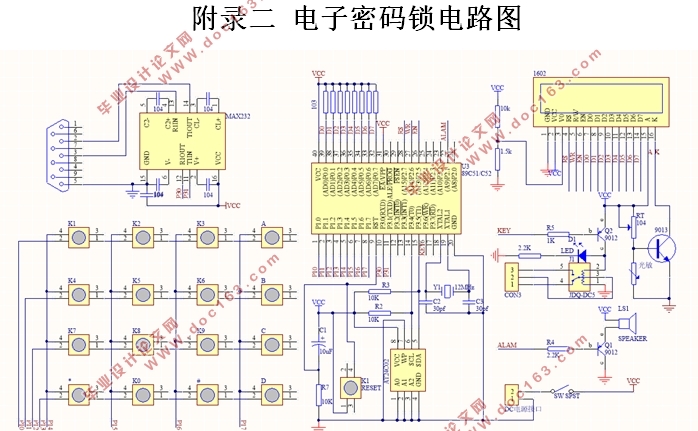基于单片机的电子密码锁设计(附电路图)

1.无需注册登录,支付后按照提示操作即可获取该资料.
2.资料以网页介绍的为准,下载后不会有水印.资料仅供学习参考之用.
密 惠 保
基于单片机的电子密码锁设计(附电路图)(任务书,开题报告,外文翻译,论文13000字)
摘要
近些年来,随着社会的发展,人们生活水平有了大幅度提高,与此同时,日常生活中的财产安全问题越来越显著。怎样才能实现家庭防盗?这个问题变得很严峻,因为人们对日常生活中的安全保险器件要求越来越高。传统的机械锁安全性能太低已经不能满足人们的需求,于是,兼顾安全性和操作性的电子密码锁就诞生了。与传统的机械锁相比,电子密码锁众多优点,不仅降低了成本还提高了安全性能,不仅有较低的功耗还具有良好的操作性。
从性价比的角度出发,本文设计了以STC89C52单片机为主控制器的电子密码锁。此次电子密码锁的设计由电子元件的电路设计和软件程序编写调试组成。其中硬件电路包括最小系统,4*4矩阵键盘,LCD1602液晶显示,AT24C02存储芯片的设计。此外电路中还包括LED提示灯,报警蜂鸣器,继电器等。软件系统调试主要是根据硬件电路,通过划分各模块的作用,来编写相应程序,并且在仿真环境中调试。使得电子密码锁能实现开闭锁,更改密码,密码状态显示,异常报警等功能。
关键词:电子密码锁 STC89C52 AT24C02 4*4矩阵键盘
[资料来源:http://think58.com]
Design of Electronic Cipher Lock Based On Single Chip Microcomputer
Abstract
With the development of society and the improvement of people’s living standard, people pay more and more attention to the security of property in the daily life. How to realize the problem of home security has become particularly prominent, so people are increasingly demanding safety devices in daily life. Because of its simple structure and low security performance, traditional machinery can’t meet the needs of people. Therefore, more secure electronic locks come into being. Compared with tradition machines, electronic locks have many advantages, such as high security, low cost, low power consumption and easy operation.
From the point of view cost performance, this paper designs an electronic code lock with STC89C52 microcontroller as its main controller. The design of the electronic code consists of hardware circuit design and software system debugging. Among them, the design of hardware and electrical appliances mainly include MCU minimum system, 4*4 matrix keyboard module, LCD1602 LCD module, and AT24C02 memory chip module design. In addition, the circuit also includes LED reminder lamp, alarm buzzer, relay and so on. The software system debugging is mainly based on the hardware circuit, through the division of each module function, to write the corresponding program, and debug in the simulation environment, and then make the electronic password lock realize the unlocking, locking, modify password, password display, error alarm and other functions. [资料来源:http://THINK58.com]
Key Words:Electronic Cipher Lock; STC89C52; AT24C02; 4*4 matrix keyboard
[资料来源:http://think58.com]

目录
摘要....................................................Ⅰ
Abstract.................................................Ⅱ
第一章 绪论..............................................1
1.1 课题简介…….................................................................................................1
1.2 研究背景及发展现状.....................................................................................1
1.3 研究目的及意义.............................................................................................2
1.4 研究思路及方法.............................................................................................3
1.5 本章小结….....................................................................................................3 [资料来源:http://THINK58.com]
第二章 系统总体设计......................................4
2.1 控制功能实现要求..........................................................................................4
2.2 设计思路…......................................................................................................4
2.3 系统框架…......................................................................................................5
2.4 元器件的选型……..........................................................................................6
2.4.1 单片机的选型........................................................................................6
2.4.2 显示模块的选型....................................................................................7
2.4.3 存储芯片的选型....................................................................................7
2.4.4 元器件清单............................................................................................7
[来源:http://www.think58.com]
2.5 本章小结..........................................................................................................9
第三章 系统硬件设计.....................................10
3.1 系统硬件概述................................................................................................10
3.2 关键单元电路设计........................................................................................10
3.2.1 单片机控制模块设计..........................................................................10
3.2.2 矩阵键盘模块设计..............................................................................13
3.2.3 液晶显示模块设计..............................................................................14
3.2.4 AT24C02模块设计...............................................................................16
3.2.5 报警电路设计......................................................................................18
3.2.6 继电器电路设计..................................................................................19
3.3 本章小结........................................................................................................20
第四章 系统软件设计.....................................21
4.1 软件流程设计................................................................................................21
4.2 各模块程序设计............................................................................................21
4.2.1 键盘扫描子程序..................................................................................22
4.2.2 密码设置子程序..................................................................................23 [资料来源:THINK58.com]
4.2.3 开锁子程序..........................................................................................24
4.3 软件调试及仿真............................................................................................24
4.4 本章小结........................................................................................................27
第五章 密码锁成品展示...................................28
5.1 密码锁焊接成品展示及注意事项................................................................28
5.2 密码锁基本功能展示....................................................................................29
5.3 本章小结........................................................................................................31
第六章 结论.............................................32
参考文献................................................33
致谢....................................................35
[资料来源:THINK58.com]
